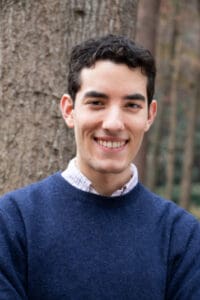A new creation
By WILLIAM FREIDANK | Published July 17, 2023
“Mom and baby are coming home from hospital and want to rest alone at house.”
When I saw this text message, I found myself unable to move on from it. I read it over and over, as though convinced it hid some unexpected clue. She was a young woman I knew, but this text message announced an existential change in her: no longer a girl, but mother.

William Freidank
Who made her a mother? I envisioned her with her baby in arms. Resting from physical fatigue and gazing at the child, she sat overwhelmed at witnessing the greatest play on human existence. Here was an irreversible transformation of one being, induced by the creation of an entirely unique other.
It’s no surprise that it struck me so acutely. The creative act of God—the sublime “seven-day” genesis of everything that holds existence—was, as though in veneration for its divine exceptionality, kept only for the angels to witness and not for the human eye to see. But the event of birth challenges that assumption: before this child was conceived in the womb, it did not exist. The existence of this rational being breathing before me is completely dependent on the mind of God thinking it into its present condition, indeed its existence at all.
The only reaction can be one of pure wonder; because, today, God has created before my eyes. I have seen the movement of God’s mind, and not only has he willed it into space and time, but he has willed the child to her, changing her own existence forever.
Could it be, then, that God creates more often than we perceive? While we are tempted to lament the world, saying “there is nothing new under the sun” (Eccl 1:9), Isaiah prophesied a rescue: “For behold, I create new heavens and a new earth” (Is 65:17). Where are these new things to be found?
I came to find this when another friend, Maria, shared with me the rebellious disaster of her experience since adolescence and her extraordinary conversion that followed. She spoke of miraculous healing, of the penetrating awareness of Christ’s eucharistic gaze causing a sensation of intense heat, of the freedom she holds in entrusting her infidelity to the fidelity of God, all despite her present struggle. To this I could only respond with silence, with an awe deeper than what even the newborn had instilled.
In the baby, I had seen God initiate a new journey; now, in my friend, I witnessed the hand of God recreate a living journey: “Therefore, if anyone is in Christ, he is a new creation; the old has passed away, behold, the new has come” (2 Cor. 5:17).
See, this is new life, this is freedom! The creation of a new child is so compelling in its vital energy that it transforms not just the individual’s own existence; it makes a young woman a mother, a young man a father, a young boy a brother, a young girl a sister, a close friend a cousin. Consider Christ announcing this to us: “And stretching out his hand toward his disciples, he said, ‘Here are my mother and my brethren! For whoever does the will of my Father in heaven is my brother, and sister and mother.’” (Mt. 12:49-50)
I saw this fulfilled in Maria and see it again in so many of my friends on campus; Christ is the child who in handing himself over to our hearts has made us into a new family, giving us renewed zest for our lives and each other, even a “hundredfold.” (Mt. 19:29)
How different this is from those who, like “old wine skins” (Mt. 9:17), are weighed down by their past, burdened with anxieties, betrayals, or regrets. Even the mere unpredictability of others can scandalize us.
However, it is Christ who invites us to “take nothing” for our journey (Mk 6:8); no provisions calculated on our efforts to draw near to him, because it is he who draws near to us, to me face to face. This tension between the cluttered version of ourself and our perfect Lord is one of a lifetime of creation in us, engaging faith, hope and love. Love is the essence of man’s heart; faith is belief in its perfection and hope struggles in the middle to bring them together. To let go of ourselves, to hold on only to Christ so that we may go out to others is an act of all three virtues.
This may be the greatest proposal before us. Every day, every hour, I am offered the gift to give witness to the creative act of God in myself. The habits of work, study, prayer; of faults, frustrations, sin; of my insensitivity, judgment, shallowness, ignorance, turbulence—they are rescued from their routine not by running from myself, but when I affirm the certainty of Christ’s Resurrection, raise my eyes to meet his and allow Christ to create in me today.